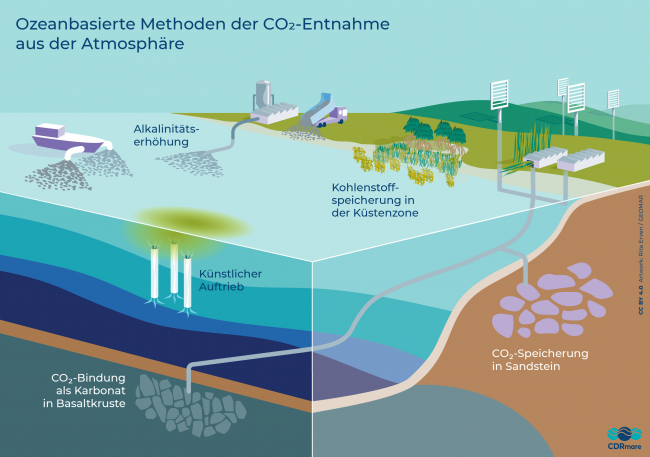04/09/2023 | In recent decades, the world’s ocean has absorbed around 25 percent of anthropogenic carbon dioxide (CO2) emissions, thus significantly slowing down climate change. This natural climate service of the ocean could be boosted systematically by enhancing the CO2 uptake of the sea through human action. Relevant methods and the respective research are outlined in the brochure now published by the research mission CDRmare “Marine Carbon Sinks in Decarbonisation Pathways” of the German Alliance for Marine Research (DAM). The brochure is now available online and free of charge at: https://cdrmare.de/factsheets. (German only)
The 62-page publication provides up-to-date knowledge on ocean-based carbon dioxide removal (CDR) methods. This information is urgently needed as society has to decide whether these are viable approaches to achieve climate goals this and if yes, how they should be implemented.
“A close exchange between science, society and politics is crucial to address the relevant national and international questions on carbon dioxide removal and to enable well-informed societal decisions. If these measures to remove CO2 are used to help achieve our climate goals, then we must prepare their implementation and regulation at an early stage. In view of the very short time remaining, the necessary debates must be held now and various actors must work together,” says Prof. Dr. Andreas Oschlies, co-speaker of the CDRmare research mission.
“With this brochure, we want to provide impulses for the pressing discussions on the options for action to achieve the climate goals. The dialogue between politics and society needs a broad knowledge base in order to make the best possible decisions. This is where we, a network of scientists from a wide range of disciplines, see our responsibility. Because one thing is certain: Not acting is not an option when it comes to the climate crisis,” adds Prof. Dr. Gregor Rehder, co-speaker of the CDRmare research mission.
The Leibniz Centre for Tropical Marine Research (ZMT) is also involved in CDRmare.. Within the framework of the research mission, Prof. Dr. Martin Zimmer from the ZMT coordinates the joint project sea4soCiety. The project aims to develop innovative and socially accepted approaches to improve the natural potential for carbon storage in vegetation-rich coastal ecosystems.
Easy to understand: The imperative for action, ocean carbon storage, five promising methods, and the challenge of a final evaluation
The brochure provides an excellent introduction to the complex topic of ocean-based carbon dioxide removal. It explains why Germany will not achieve its climate targets without the use of CDR techniques and explains how the ocean naturally absorbs and stores carbon dioxide from the atmosphere. After all, ocean-based CDR processes aim to enhance precisely these uptake processes.
The brochure then presents three ocean-based CDR and two geological storage methods that are being studied as part of the research mission. It explains how each of them works, its technical development status and the theoretical extraction and storage potential. A summery of the current knowledge about risks and side effects and a description of knowledge gaps to be filled by the further CDRmare research round of the publication.
The methods described include: 1) the expansion of carbon-rich coastal ecosystems, 2) artificial upwelling, 3) approaches to enhance the alkalinity of the ocean, and 4+5) two methods for storing captured carbon dioxide in sandstone formations as well as basalt deep below the seabed (Carbon Capture and Storage, CCS).
Furthermore, the brochure explains, how the CDRmare scientists intended to bring together the results of the participating research consortia and to evaluate them transparently and comprehensibly. This requires not only asking whether a method is technically, legally or politically feasible, but also whether its use can be described as desirable when judged by the ethical and moral principles of society.
“The new brochure of the DAM research mission CDRmare provides decision-makers in politics, economy and society with a good overview of current findings on the role of the ocean in the uptake and long-term storage of carbon dioxide from the atmosphere - a crucial factor in achieving climate neutrality in the coming decades,” concludes Dr. Joachim Harms, Chairman of the Board of DAM.
The brochure, which includes a welcome address by the German Federal Minister of Education and Research, Bettina Stark-Watzinger, has been published under the title: “Gezielte Kohlendioxid-Entnahme: Welche Möglichkeiten meeresbasierte Verfahren bieten und wie diese erforscht warden” (Targeted Carbon Dioxide Removal: What Possibilities Ocean-Based Methods Offer and How These Are Being Researched). It can be downloaded free of charge from the CDRmare website https://cdrmare.de/factsheets/.
The research mission CDRmare – short for “Marine Carbon Storage as a Pathway to Decarbonisation” (CDR = Carbon Dioxide Removal) – is funded by the German Federal Ministry of Education and Research (BMBF) for currently three years with around 26 million Euros and combines the expertise of a total of 22 research institutions, authorities and companies. Coordinated at GEOMAR Helmholtz Centre for Ocean Research Kiel and the Leibniz Institute for Baltic Sea Research Warnemünde (IOW), scientists in six research consortia have been working since August 2021 on various methods aimed at expanding the ocean’s potential to absorb and store CO2 from the atmosphere. Risks and possible impacts of such methods on the marine environment and the Earth system, as well as the social, ethical and legal aspects of such measures, are also being researched.
For more information on the research mission, including topical fact sheets on various methods of marine CO2 removal and storage (alkalinisation, blue carbon, artificial upwelling, CCS), see: https://cdrmare.de/en/.
The German Marine Research Alliance (DAM) with its 24 member institutions develops solution-oriented knowledge and policy options for a sustainable use of coasts, seas and oceans.





